20% of companies provide a monthly work-from-home allowance and about 60% set work-from-home rules to maintain employee performance.
-en world Japan Survey on support of employees working from home-
en world Japan K.K. (headquarters: Chuo City, Tokyo, president: Vijay Deol), one of Japan’s largest recruiting firms specializing in global human resources, conducted a questionnaire survey to foreign capital companies and Japanese companies on the initiatives to support employees during the COVID-19 crisis, and 269 companies responded.
Summary of survey results
・20% of companies provide a monthly work-from-home allowance, and Japanese companies tend to pay a higher rate than foreign capital companies.
・65% of companies suspended the commuter pass allowance and now provide an allowance according to the number of days employees come to work.
・Initiatives to maintain and improve employee performance in a work-from-home environment. The most frequent answer was “setting up rules for working from home.”
・Survey on initiatives to improve and maintain engagement of employees working from home. The most common answer was to gain insight into employee satisfaction on the work environment and work styles.
・61% of companies implement regular meetings with seniors to maintain the physical and mental health of employees. The percentage providing professional consulting services is higher in foreign capital companies than in Japanese companies.
・About 70% of companies provide or lend laptops to employees. About 40% of companies adopted flextime.
Comment on the results

Vijay Deol, President &Representative Director
The COVID-19 pandemic has forced change on companies around the world and across industry sectors. Prioritizing employees’ health and safety has become more important than ever before. Allowing for and adjusting to flexible and remote working styles have been one of the ways in which companies have made efforts to meet social distancing expectations and ensure people do not have to work in environments they may feel risky to their health. It is, therefore, no surprise that companies have also looked into investments and best practices that will ensure people can work as productively as possible.
From developing meeting schedules, to facilitate interaction and engagement, to providing laptop computers or an allowance for home office products, companies have been making efforts to support people with remote and flexible working arrangements. As this change in working style is also very new to most companies, efforts to communicate and understand employees’ needs, challenges, and engagement has also been very important. It is unlikely that work styles will return to the same as the pre-COVID environment so companies will need to continue to focus efforts on managing the evolution of flexible and remote work.
Details of survey results
1. 20% of companies provide a monthly work-from-home allowance, and Japanese companies tend to pay a higher rate than foreign capital companies. (Fig. 1, Fig. 2, Fig. 3)
We asked companies adopting work from home for all or some employees if they provided a work-from-home allowance. 20% responded that they provide the allowance every month (foreign capital companies: 21%, Japanese companies: 20%). When we asked about the monthly allowance amount, the most common answers were " 3,000–4,999 yen” by foreign capital companies (foreign capital companies: 41% and Japanese companies: 33%) and "5,000–9,999 yen” by Japanese companies (foreign capital companies: 35% and Japanese companies: 39%). The percentage of companies that responded “10,000 yen or more” was higher for Japanese companies than foreign capital companies by 11% (foreign capital companies: 6% and Japanese companies: 17%) . The survey showed the tendency for the allowance to be relatively higher in Japanese companies.
Also, 7% (foreign capital companies: 5% and Japanese companies: 12%) responded that they provided a one-time allowance, and with respect to the allowance amount, the most common answer was “10,000–49,999 yen”.
[Fig. 1] Do you provide a work-from-home allowance?
Work-from-home allowance: allowance for communication expenses, light and water expenses, and allowance for expenses to maintain/keep of working environment at home.
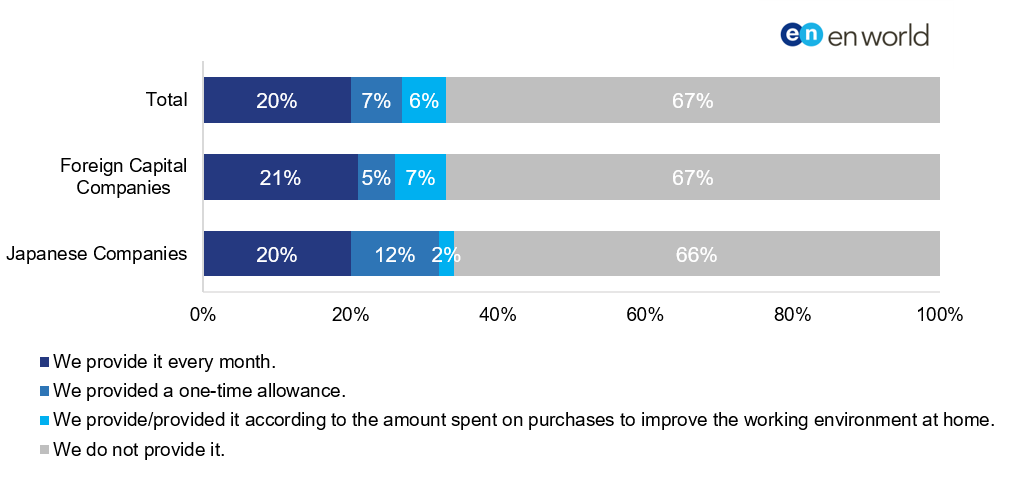
[Fig. 2] Please respond if you provide a work-from-home allowance every month. What was the allowance amount?
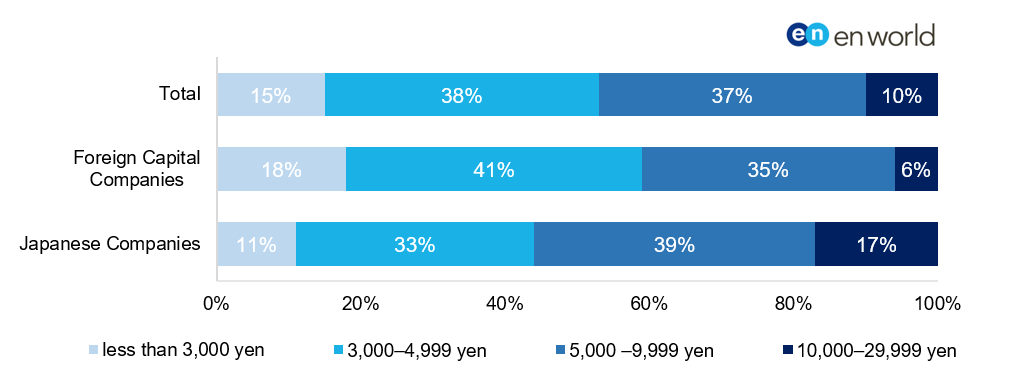
[Fig. 3] Please respond if you provided a one-time allowance. What was the allowance amount?
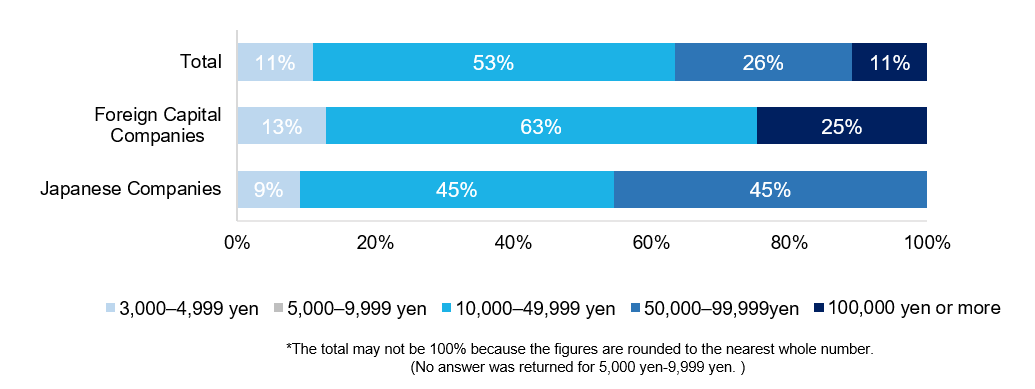
2. 65% of companies suspended the commuter pass allowance and now provide an allowance according to the number of days employees come to work.(Fig. 4, Fig. 5, Fig. 6)
We asked companies about the payment of benefits other than work-from-home allowances. With respect to commuter allowances, 65% responded that they suspended the commuter pass allowance and now provide an allowance according to the number of days employees come to work. (foreign capital companies: 67%, Japanese companies: 62%).
Some companies started allowing employees to commute to work by car and bicycle. A few companies provide infection control allowances at 7% (foreign capital companies: 6%, Japanese capital companies: 8%) and COVID-19-risk allowance at 5% (foreign capital companies: 4%, Japanese companies: 6%).
[Fig. 4] Do you provide a commuter allowance?
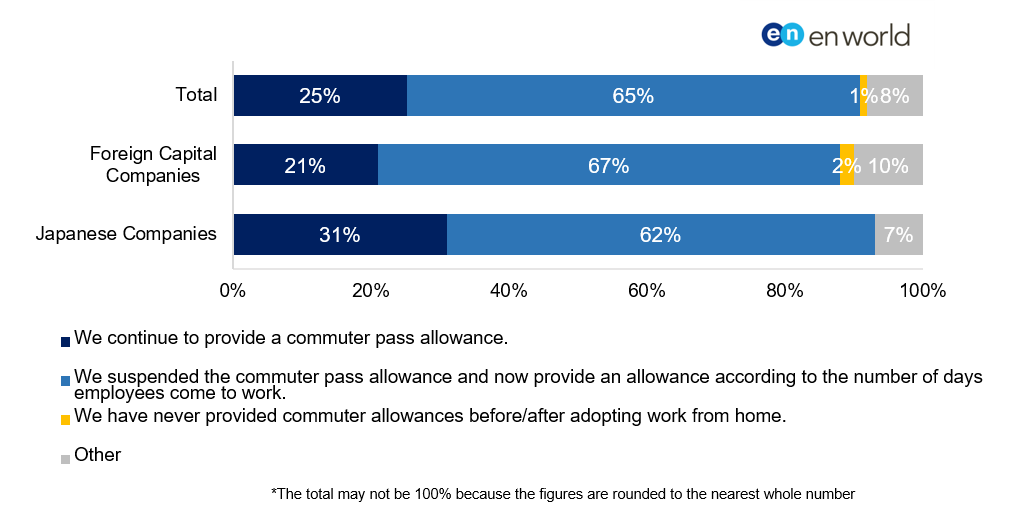
[Fig. 5] Do you provide an infection control allowance?
Infection control allowance: Subsidies to purchase face masks, disinfectants, and other supplies.
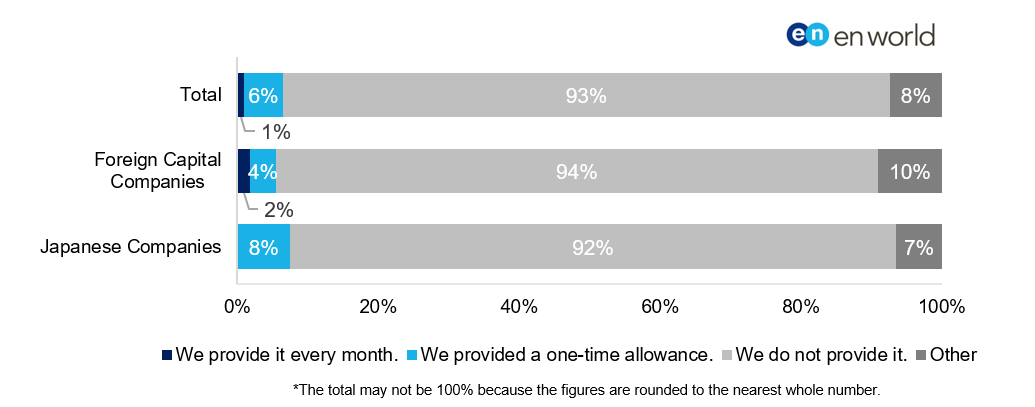
[Fig. 6] Do you provide a COVID-19 risk allowance?
COVID-19 risk allowance: Payment provided to employees in an environment with a high risk of exposure to COVID-19.
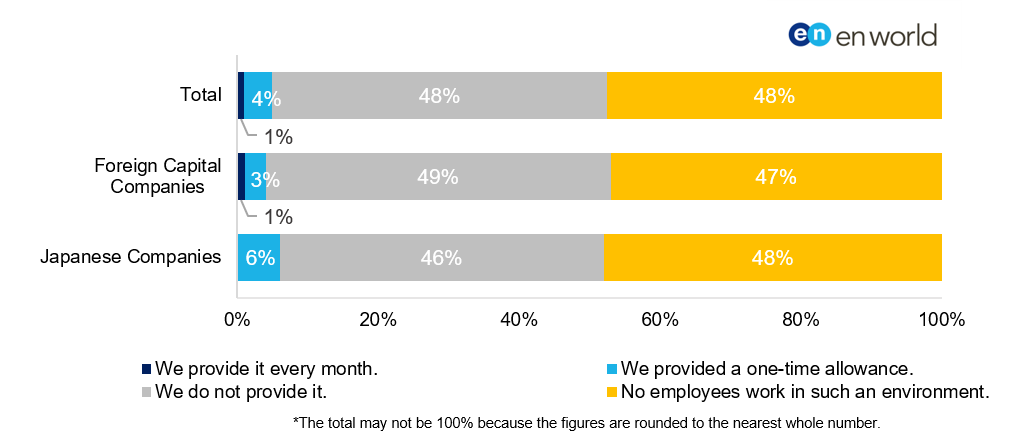
▼Changes in treatments and welfare in response to the COVID-19 outbreak
・Employees are allowed, upon request, to commute to work by car (Foreign capital company/manufacturing, engineering, automobile)
・The commuter allowance has been suspended for employees commuting to work less than three days a week. (Foreign capital company/health care, pharmaceutical, life science)
・The commuter allowance has been reduced. (Foreign capital company/import and sales)
・Subsidies are provided for employees that had to commute to work during the state of emergency. (Foreign capital company/health care, pharmaceutical, life science)
・Employees are allowed to commute to work by bicycle (Japanese company/health care, pharmaceutical, life science)
3. Initiatives to maintain and improve employee performance in a work-from-home environment. The most frequent answer was “setting up rules for working from home.” (Fig. 7)
We asked companies about the initiatives to maintain and improve employee performance after adopting a work-from-home/remote work system. The most common answer was “setting up rules and regulations for working from home and remote working”(foreign capital companies: 52%, Japanese companies: 66%). The difference was most significant between foreign capital companies and Japanese companies in "Sharing tips and tricks for working from home and working remotely” where foreign capital companies were 17% higher (foreign capital companies: 38%, Japanese companies: 21%).
[Fig. 7] Are there any initiatives that you started to maintain and improve employee performance after adopting a work-from-home/remote work system ? (Multiple answers allowed)
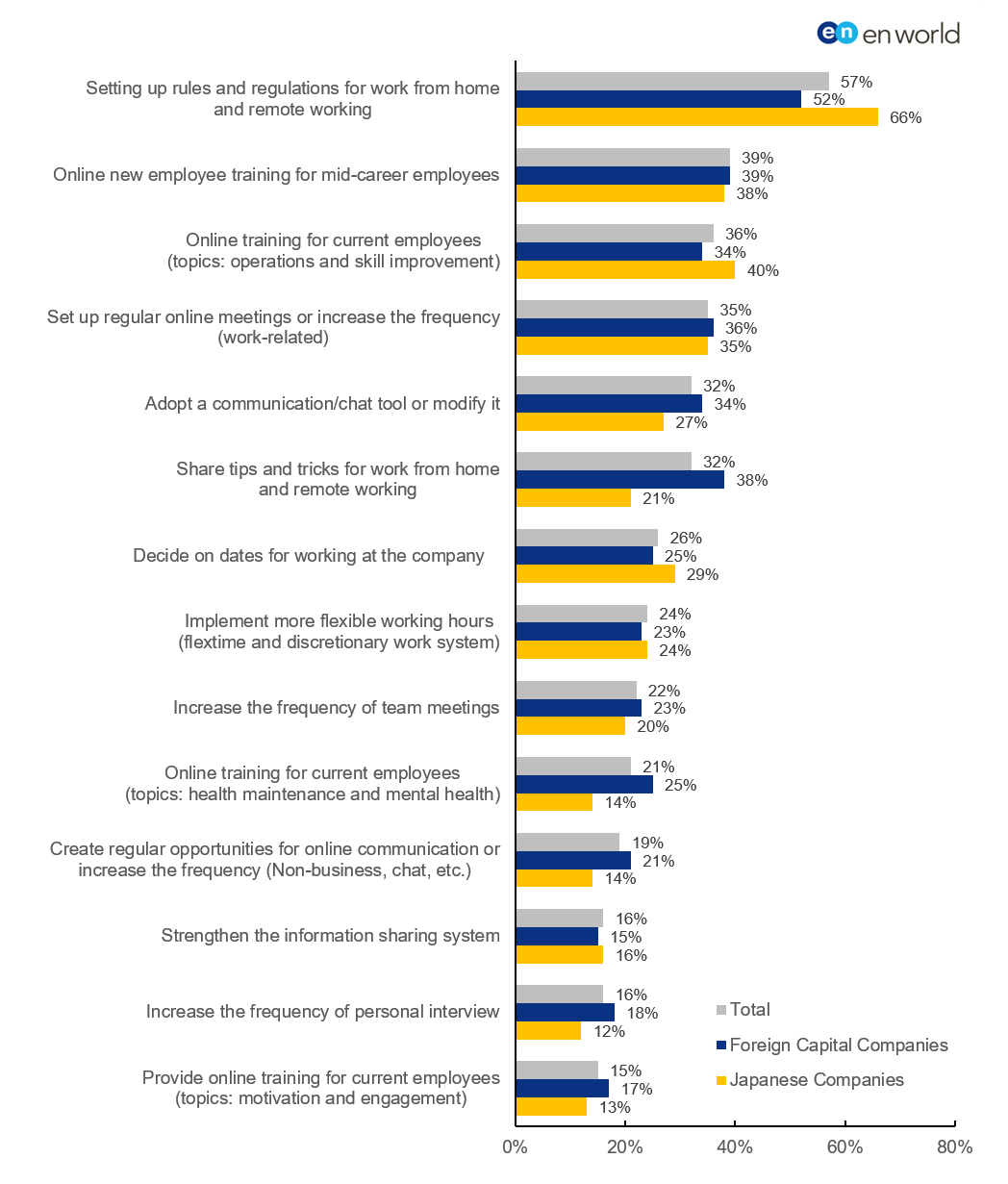
4. Survey on initiatives to improve and maintain engagement of employees working from home. The most common answer was to gain insight into employee satisfaction on the work environment and work styles. (Fig.8)
When we asked companies about the initiatives to improve and maintain the engagement of employees working from home or working remotely, the most common answer was “gaining insight into employee satisfaction on work styles.” (foreign capital companies: 26%, Japanese companies: 23%) The difference was most significant between foreign capital companies and Japanese companies in "Conduct company-wide meetings / Increase the frequency” where foreign capital companies were 22% higher (foreign capital companies: 25%, Japanese companies: 3%).
[Fig. 8] Are there any initiatives to maintain and improve employee engagement after adopting a work-from-home/remote-work system?(Multiple answers allowed)
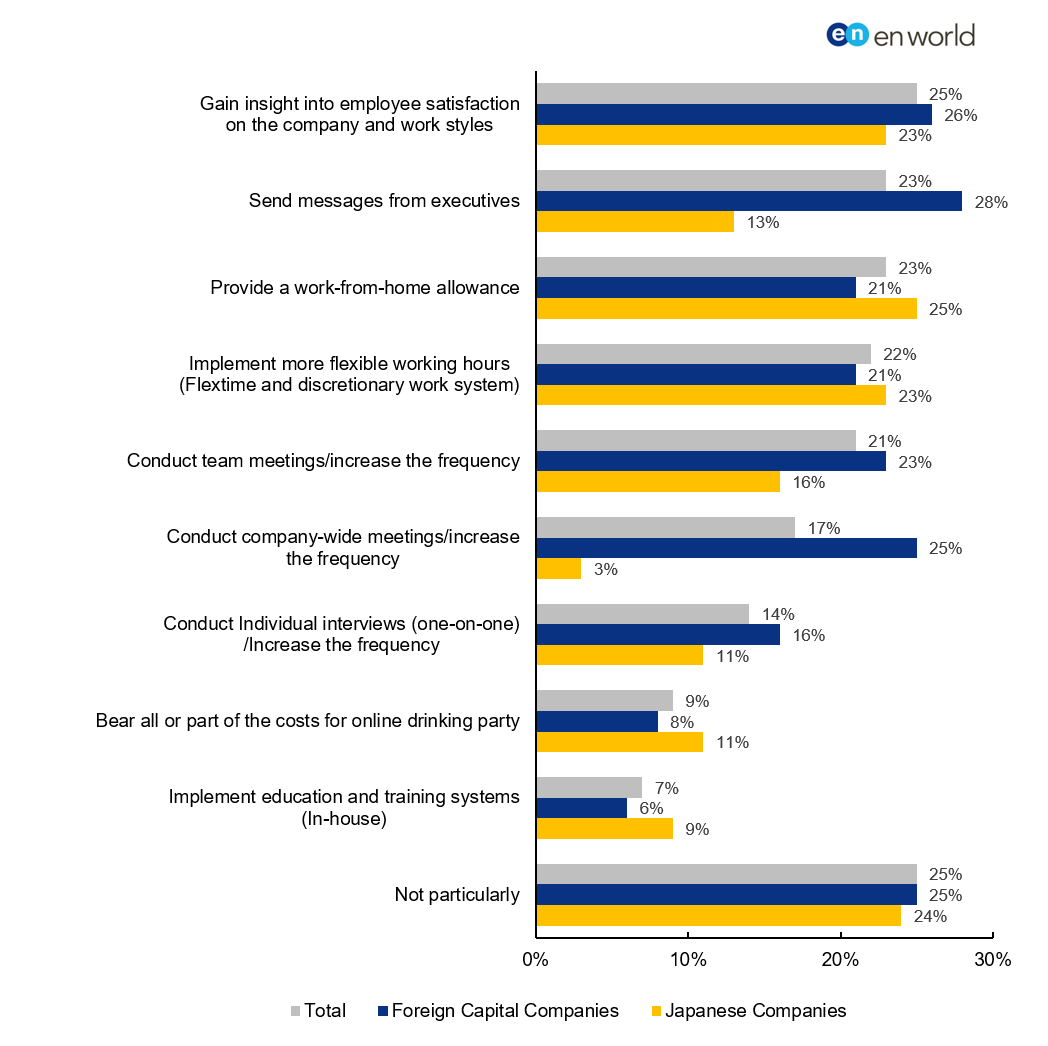
5. 61% of companies implement regular meetings with seniors to maintain the physical and mental health of employees. The percentage providing professional consulting services is higher in foreign capital companies than in Japanese companies. (Fig. 9)
We asked companies about the initiatives to maintain and improve the physical and mental health of employees in a work-from-home/remote-work environment. The most common answer was conducting regular meetings with seniors (foreign capital companies: 58%, Japanese companies: 67%). The survey showed the characteristics of foreign capital companies and Japanese companies; while Japanese companies responding in the affirmative outnumbered foreign capital companies by 9%, the percentage providing professional consulting services was higher by 18% in foreign capital companies (foreign capital companies: 39%, Japanese companies: 21%).
[Fig. 9] Are there any initiatives to maintain and improve the physical and mental health of employees after adopting a work-from-home/remote-work system? (Multiple answers allowed)
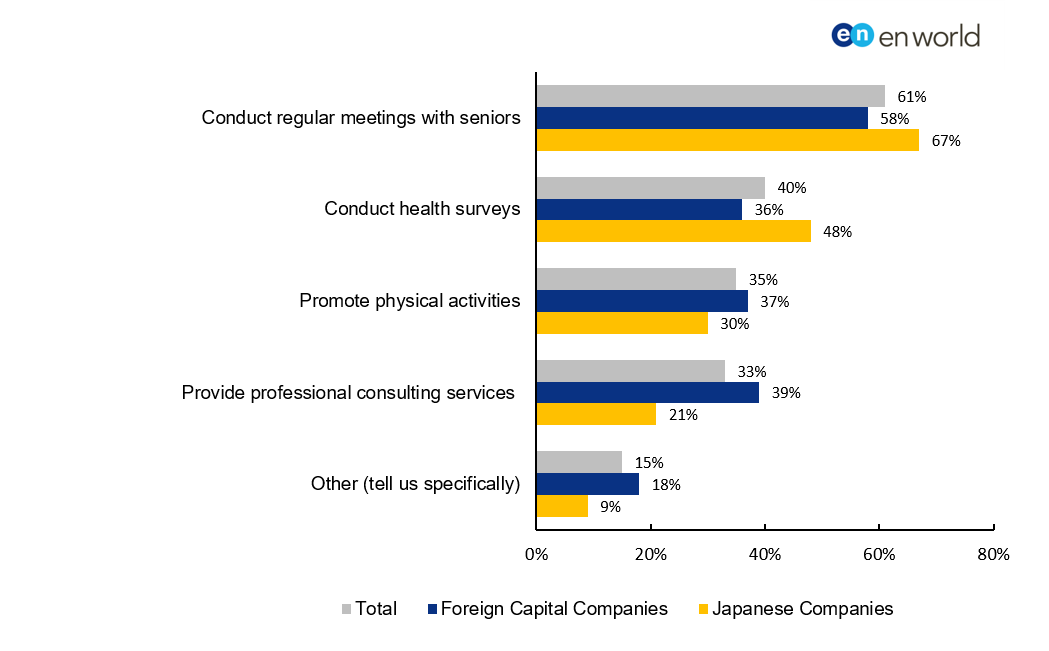
6. About 70% of companies provide or lend laptops to employees. About 40% of companies adopted flextime. (Fig.10)
We asked companies about the initiatives to maintain and improve the employee work environment after adopting a work-from-home/remote-work system. The most common answer was “providing/lending laptops” (foreign capital companies: 69%, Japanese companies: 70%). Also, 39% (foreign capital companies: 37%, Japanese companies: 41%)of companies responded that they adopted a flextime system. The survey showed that companies are putting more value in flexibility in not only places of work but also working hours.
[Fig. 10] Are there any initiatives to maintain and improve the employee work environment after adopting a work-from-home/remote-work system? (Multiple answers allowed)
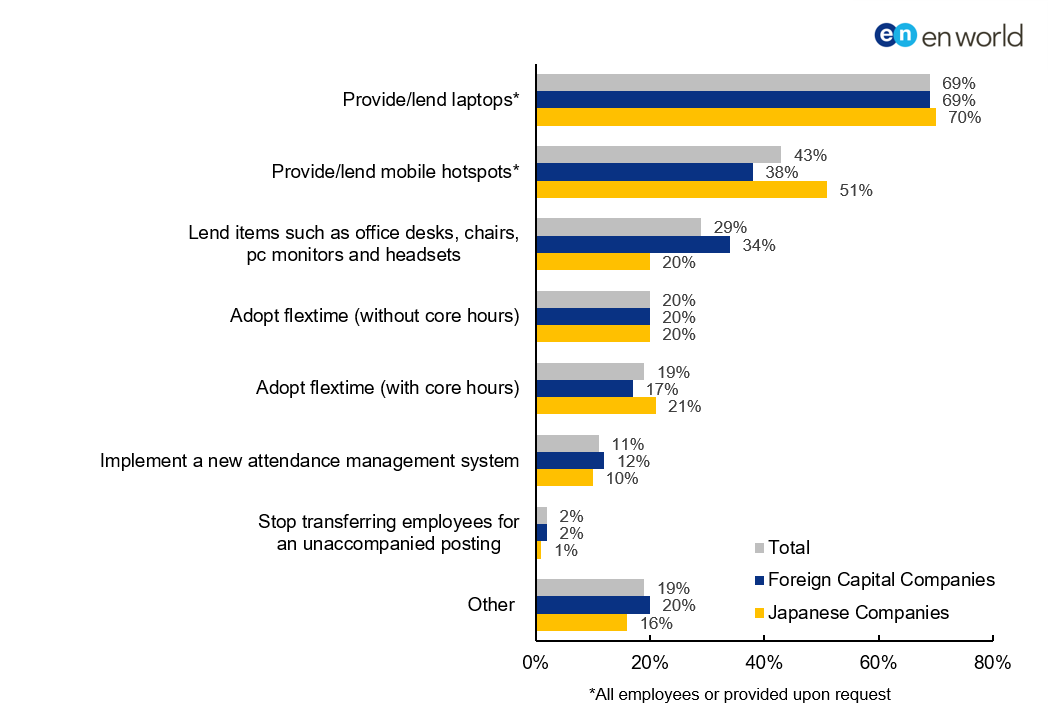
▼Other Responses
・Provide mobile phones for all employees (Foreign capital company/wholesale sales)
・Implement e-signatures (Foreign capital company/health care, pharmaceutical, life science)
・Implement security measures and adopt support tools to promote employee engagement (Foreign capital company/IT, communications)
・Lend smartphones (Japanese company/ manufacturing, engineering, automobile)
・Subsidize the purchase of business equipment (Japanese company/IT, communications)
・Provide the costs for maintaining a telecommunications environment (Japanese company/IT, communications)
---------------------------------------------
[Outline of the survey]
Survey method: Online survey
Area: Japan
Number of valid answers: 269
Period: November 4 - November 10, 2020
Respondent attribute: Foreign Capital Company 64% Japanese company 36%
---------------------------------------------
About en world Japan (https://www.enworld.com/)
en world Japan is a recruiting firm established in 1999 specializing in global human resources with offices in four countries in the Asia-Pacific region. We specialize in supporting Foreign Capital Companies and global Japanese companies in recruiting human resources for middle to high level positions. We help companies with recruitment and job seekers with career changes from every angle by staffing full-time workers, professional human resources, and executive human resources and providing recruitment process outsourcing solutions.
Contact information for inquiries about this news release
en world Japan K.K. PR representative
Email : enworld-pr@enworld.com
Tokyo Square Garden 12F, Kyobashi 3-1-1, Chuo-ku, Tokyo 104-003
